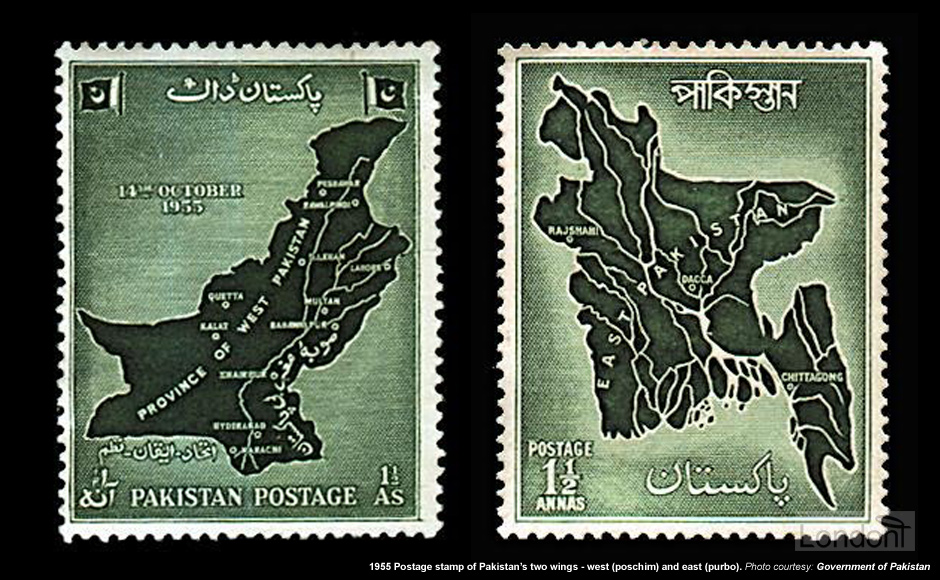
West Pakistan's view of the Bhasha Andolon
Last updated: 5 October 2017 From the section 1952 Bhasha Andolon
Although the Language Movement is considered to have laid the foundations for ethnic nationalism in many of the Bengalis of East Pakistan, it also heightened the cultural animosity between the authorities of the two wings of Pakistan. In West Pakistan, the movement was seen as a sectional uprising against Pakistani national interests.
The rejection of the "Urdu-only" policy was seen as a contravention of the Perso-Arabic culture of Muslims and the founding ideology of Pakistan, the Two-Nation Theory.
Not only were Bengalis removed from Punjabis, Pathans, and Sindhis by linguistic culture, but Islam was far less a common bond than might be assumed. Bengali Islam was the religion of the indigenous depressed peasant convert; in West Pakistan, Islam was the faith of the conquerors, the rulers, the courtiers. Or, as Ayub Khan had put it, Bengali Islam was a faith associated with the "downtrodden races".
Crawford Young, author of "The Politics of Cultural Pluralism" (1979)
Bengali not only contravened the principle of a single national language, in the eyes of the Muslim League elite, its literary heritage was mainly Hindu, and its script was Devnagari (or Hindu) and bore the dangerous germs of pan-Bengali Nationalism. Some of the most powerful West Pakistani politicians considered Urdu a product of Indian Islamic culture, while they saw Bengali as a part of "Hinduized" Bengali culture.
East Bengalis... probably belong to the very original Indian races. It would be no exaggeration to say that up to the creation of Pakistan, they had not known any real freedom or sovereignty. They had been in turn ruled either by the caste Hindus, Moghuls, Pathans, or the British. In addition, they have been and still are under considerable Hindu cultural and linguistic influence. As such, they have all the inhibitions of down-trodden races and have not yet found it possible to adjust psychologically to the requirements of the new born freedom.
Their popular complexes, exclusiveness, suspicion, and a sort of defensive aggressiveness probably emerge from this historical background.
Most,however,stood by the "Urdu only" policy as they believed that only a single language, one that was not indigenous to Pakistan, should serve as the national language. This kind of thinking also provoked considerable opposition in West Pakistan, wherein there existed several linguistic groups.
The Awami Muslim League turned over to Bengali nationalism after the Movement, and shed the word "Muslim" from its name. This ethnic nationalist approach of the party led to alienation of leaders such as Golam Azam who were supportive of the Muslim activism rather than the ethnic nationalist approach. The Language Movement inspired similar discontent in West Pakistan and provided momentum to ethnic nationalist parties. The political unrest in East Pakistan and rivalry between the central government and the United Front-led provincial government was one of the main factors culminating in the 1958 military coup by Ayub Khan.
Condemnations of the police firing also came from the Alia Madrasah, Islamic Brotherhood, Dhaka Traders Association and other organizations. Interestingly, a fairly good number of organizations in West Pakistan stepped into the scene with their criticism of the government action of February 21.
On 23 February 1952, the Karachi-based newspaper Dawn, in a long editorial on the tragedy of February 21, had this to say in substance:
"All Pakistan will grieve and our enemies will derive comfort and cheer from the tragic happenings at Dacca. First and foremost we offer homage to those who have paid the forfeit of their lives in the conflict between their convictions on the one hand, and the principle that law and order shall be maintained, on the other hand….
But every dark cloud has a silver lining and out of these grievous happenings has emerged the final knowledge of how deeply our people and our kith and kin in East Pakistan feel on the language issue... We can assure the people of East Pakistan that the people of West Pakistan will not grudge them the equality with Urdu which Bengali has at last won".
